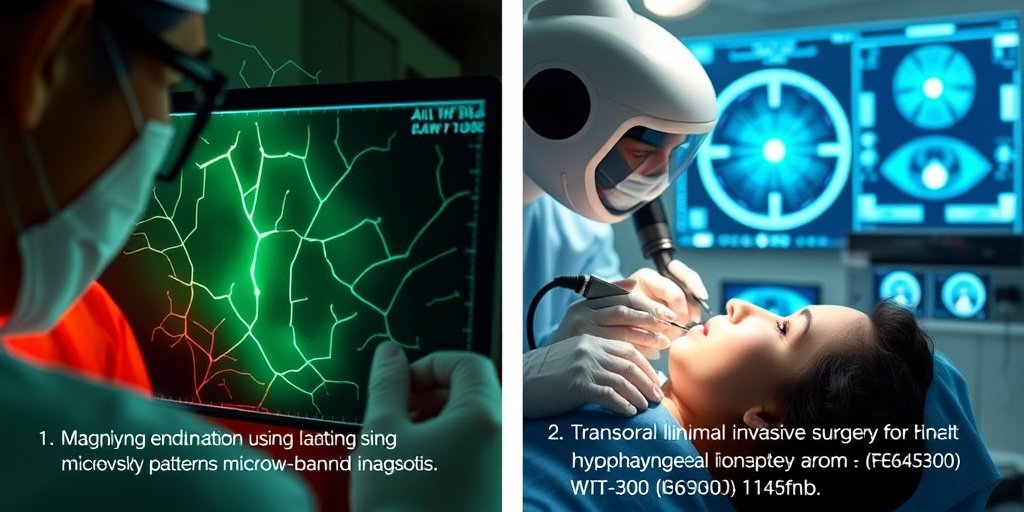⚡ Quick Summary
This review highlights the advancements in the diagnosis and treatment of early hypopharyngeal carcinoma (HC), a rare and aggressive head and neck cancer. Key innovations include magnifying endoscopy with narrow-band imaging (ME-NBI) and the use of artificial intelligence (AI) for improved detection rates and treatment outcomes.
🔍 Key Details
- 📊 Focus: Early hypopharyngeal carcinoma and precancerous lesions
- 🧩 Risk Factors: Smoking and drinking
- ⚙️ Technologies: Magnifying endoscopy with narrow-band imaging (ME-NBI), AI algorithms
- 🏆 Treatment Options: Larynx-preserving surgery, radiotherapy, and transoral minimally invasive surgery
🔑 Key Takeaways
- 📈 Early diagnosis is crucial for improving patient prognosis in hypopharyngeal carcinoma.
- 🔍 ME-NBI enhances visualization of microvascular patterns, aiding in early lesion detection.
- 🤖 AI technology shows promise in detecting early HC through deep learning algorithms.
- 🏥 Larynx-preserving surgery is recommended for early-stage patients to maintain vital functions.
- 🌟 Transoral minimally invasive surgery is gaining traction due to its reduced morbidity and faster recovery times.
- 🚭 Preventive measures targeting environmental risk factors could significantly lower HC incidence.
- 📅 Study published in Medicine (Baltimore), 2025.

📚 Background
Hypopharyngeal carcinoma is one of the rarest and most aggressive forms of head and neck cancer, often diagnosed at advanced stages due to its insidious location and atypical early symptoms. The primary risk factors include smoking and alcohol consumption, which necessitate targeted preventive interventions to reduce incidence rates.
🗒️ Study
This review aims to summarize the current advancements in the diagnosis and management of early hypopharyngeal carcinoma. It emphasizes the importance of early detection and the role of innovative technologies such as ME-NBI and AI in improving patient outcomes.
📈 Results
The findings indicate that ME-NBI significantly improves the detection rate of early lesions and assesses invasion depth effectively. Additionally, the integration of AI in early HC detection presents a promising avenue for enhancing diagnostic accuracy and treatment planning.
🌍 Impact and Implications
The advancements discussed in this review could lead to a paradigm shift in the management of hypopharyngeal carcinoma. By focusing on early detection and employing minimally invasive techniques, healthcare providers can improve oncological control while preserving essential functions, ultimately enhancing the quality of life for patients.
🔮 Conclusion
This review underscores the critical need for early diagnosis and innovative treatment strategies in hypopharyngeal carcinoma. The integration of technologies like ME-NBI and AI holds great promise for improving patient outcomes. Continued research and development in this field are essential to further enhance the management of this challenging cancer type.
💬 Your comments
What are your thoughts on the advancements in the diagnosis and treatment of hypopharyngeal carcinoma? We invite you to share your insights and engage in a discussion! 💬 Leave your comments below or connect with us on social media:
Developments in diagnosis and treatment of early hypopharyngeal carcinoma and precancerous lesions: A review.
Abstract
Hypopharyngeal carcinoma (HC) is one of the rarest and worst head and neck cancers (HNC) with insidious location, atypical early symptoms, and frequently diagnosed in advanced stages. The risk factors of HC mainly include smoking and drinking. Preventive interventions directed towards environmental risk factors are highly likely to yield far-reaching beneficial effects in reducing the incidence of this disease. The majority of advanced HC patients undergo multimodal treatments that encompass radiotherapy, chemotherapy and surgery, with poor oncological and functional outcomes. The early diagnosis and management of HC are vital for improving the prognosis of patients. Currently, there are few reviews specifically focusing on early HC, thus this review aims to summarize the current advancements in the diagnosis and management of early HC. Magnifying endoscopy with narrow-band imaging (ME-NBI) can improve the detection rate of early lesions and assess the invasion depth by enhancing the visualization of microvascular patterns. In recent years, artificial intelligence (AI) presents a promising prospect in the detection of early HC through deep learning algorithms. Larynx-preserving surgery or radiotherapy alone is predominantly recommended for individuals diagnosed at an early stage, aiming to achieve optimal oncological control while preserving crucial functions. With the increasing detection rates of early HC and the development of surgical equipment, transoral minimally invasive surgery is becoming more widely applied in HC. Its minimally invasive nature offers reduced morbidity and faster recovery, making it an attractive option for eligible patients with early HC.
Author: [‘Cheng J’, ‘Liu Y’, ‘Tang X’, ‘Zhao R’, ‘Bao Y’]
Journal: Medicine (Baltimore)
Citation: Cheng J, et al. Developments in diagnosis and treatment of early hypopharyngeal carcinoma and precancerous lesions: A review. Developments in diagnosis and treatment of early hypopharyngeal carcinoma and precancerous lesions: A review. 2025; 104:e45617. doi: 10.1097/MD.0000000000045617